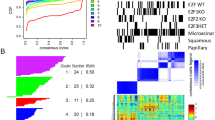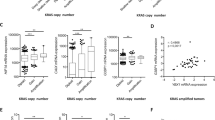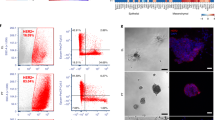Abstract
Benign rat mammary epithelial cells transfected with restriction enzyme-fragmented DNA from a human malignant metastatic cell line (Ca2-83) produces transfectants that yield metastatic tumours in syngeneic rats. The six metastasis-inducing DNAs (Met-DNAs) that have been isolated from such transfectants are subgene in size and do not code for any expressed mRNAs, but correspond to potential regulatory regions of human DNA from malignant, metastatic cells. In pilot studies the one Met-DNA tested is detectable in some human breast tumours but not in normal tissue. Transfection of all six Met-DNAs singly into the benign mammary epithelial cells causes enhanced expression of osteopontin, whilst transfection of cDNA for osteopontin also induces the metastatic state. These results show that short regulatory DNAs exist in human cancer cells that can induce metastatic spread via a common effector gene, osteopontin, in model rat mammary cell lines.
This is a preview of subscription content, access via your institution
Access options
Subscribe to this journal
Receive 50 print issues and online access
$259.00 per year
only $5.18 per issue
Buy this article
- Purchase on Springer Link
- Instant access to full article PDF
Prices may be subject to local taxes which are calculated during checkout
Similar content being viewed by others

Author information
Authors and Affiliations
Rights and permissions
About this article
Cite this article
Chen, H., Ke, Y., Oates, A. et al. Isolation of and effector for metastasis-inducing DNAs from a human metastatic carcinoma cell line. Oncogene 14, 1581–1588 (1997). https://doi.org/10.1038/sj.onc.1200993
Received:
Revised:
Accepted:
Issue Date:
DOI: https://doi.org/10.1038/sj.onc.1200993
Keywords
This article is cited by
-
Osteopontin is a promoter for hepatocellular carcinoma metastasis: a summary of 10 years of studies
Frontiers of Medicine (2014)
-
Osteopontin splice variants expressed by breast tumors regulate monocyte activation via MCP-1 and TGF-β1
Cellular & Molecular Immunology (2013)
-
Interferon-induced transmembrane 3 binds osteopontin in vitro: expressed in vivo IFITM3 reduced OPN expression
Oncogene (2010)
-
The prognostic significance of preoperative plasma levels of osteopontin in patients with TNM stage-I of hepatocellular carcinoma
Journal of Cancer Research and Clinical Oncology (2010)
-
Genomic aberrations in hepatocellular carcinoma related to osteopontin expression detected by array-CGH
Journal of Cancer Research and Clinical Oncology (2010)


